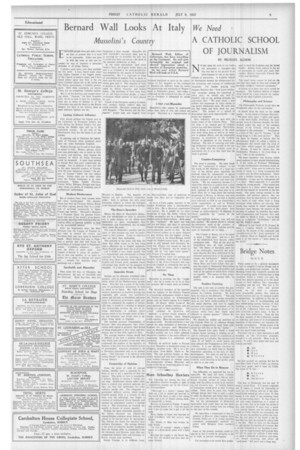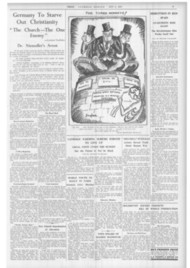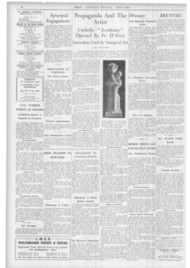Page 5, 9th July 1937
Page 5

Report an error
Noticed an error on this page?If you've noticed an error in this article please click here to report it.
Tags
Share
Related articles
Spai And The Newspapers
Italy Stands At The Cross-roads
Fascism And Democracy Is There A Catholic Middle Way?
Mime Without A Harpsichord
" Italy And The War Mind"
Bernard Wall Looks At Italy
Mussolini's Country
FNGLISH people have got such a hate on Italy at present that it is hard to be reasonable. Either one joins in with the mob, or else one becomes—by way of reaction—a ferocious defender of all things Italian.
Catholics seem more sore than anybody on this point. I have heard some argue that Italian Fascism is the biggest enemy of the Church in modern times; and I have heard others agree that Italy is the one great Catholic nation left in the world and the Italian government a Catholic government. Both these statements are untrue. There are no completely Catholic nations.
But in all this bowling and counter-howling about " Fascism," we have forgotten Italy. So let us look at Italy for a moment. Italy not in terms of finance or of the Abyssinian war and the threat to the British Empire, hut Italy in her history, Italy as most ordinary Italians see her.
Lasting Cultural Influence
Italy played perhaps the biggest part in the formation of European culture, not only during the Roman Empire but also during the Middle Ages and up to the eighteenth century. At the time of the Renaissance, Italy was the home of art and science.
In painting and in literature the inhabitants of Florence alone produced more than any other European kingdom.
Modern Europe can be saki to have gone to school in Italy. History, physics, music and even philosophy owe as much to Italy as poetry and painting. Italy became the standard by which all things European could be measured. It must have seemed as though Italy had every conceivable advantage. For in addition it was, and still is, the most beautiful country of Europe, with the most temperate climate, "the garden of Europe " where the sun always shines. Italian cities arc to other cities what the Italian landscapes is to other landscapes. Rome, Naples, Florence, Venice, Milan, Bologna, Perugia and many other towns are jewels of loveliness and of architectural achievement.
Modern Flinderances
But in modern times Italy became more and more handicapped. The disunity which had built up Florence, Venice, Rome and other capitals, placed Italy in a condition of servitude successively to Spain, France ansl Austria. Alessandro Manzani in I Promessi Sposi, the greatest Italian novel and one of the world's great historical novels, describeswith -bitterness. thecorrupting effect of Spanish soldiery in Italy in the seventeenth century.
After the Napoleonic wars. the Holy Alliance—like the League of Nations today—tried to reward the victors and Northern Italy was once more in Austria's hands. Many Italians had seen in Napoleon a saviour and they had learnt the possibilities of national union in Napoleon's
armies. " Unisons-a-4 atniamoci . giuriamo far libero ii suolo natio . . Giâ l'aquila d'Austria Ic penne ha perdute" (let us love one another, let us unite together, let us swear to liberate our native soil . . . already the Austrian eagle is moulting) ran a ballad.
Garibaldi and Mussolini
Then came the wars of liberation, the Risorgimento, the epic of Garibaldi and
the thousand. Since that time, what has happened is clear enough. Mussolini follows Garibaldi's nationalist ideal, and he is carrying on—in probably the only way it could have been carried on—the work of the national unification of Italy.
At the word nationalism, used about modern Italy, the English reader draws up and is as irritated as his great-grandfather was delighted by the success of Garibaldi's nationalism. But it is important to think of nationalism in modern Italy in terms of Italy and the same applies to the militarism which goes with it. The situation of Italy is peculiar in this respect and it is complicated by Italian character and Italian habits. The problems of Italy were those of an old hyper-civilised people, a weary civilisation which seemed to have played its part. I know of no European country in which, until recently, Italian soldiers were not called cowards. Macaulay compared them with Bengalis. "The Italians and the Portuguese " people said, and laughed from
Warsaw to Madrid. The majority of Italians are not particularly nationalist, either. Italy is perhaps the only great European country in which the foreigner is not despised simply because he is foreign.
The Duce's Speeches Hence the effect of Mussolini's militarism and natiohalistn on Italy is certainly not to make Italians on the whole more militaristic or more nationalistic than Frenchmen and Englishmen, but to make them about the same.
The tone of Mussolini's speeohes and the letter of laws enacted can only be understood in their context. Taken in abstract° they are more than misleading.
The policing of the trains and fines for those who allow trains to be late bring Italy's efficiency up to English standards, Many English people think this is all wrong —and I dislike it very much myself—but it is hypocritical and unbalanced to blame especially the Italians for imitating, in an Italian way, those methods from which-the English and French profit, methods whose advantages they would not be prepared to abandon. It is the same with the Empire.
Anarchic Strain Italians are by character extremely independent, with an inclination towards anarchism which all the Mediterranean peoples share. This fact was a cause of the weakness of parliamentary democracy in Italy as much as in Spain. But while parliamentary democracy in southern Europe has repeatedly split society into anarchistic atoms and led only to bloodshed, and some form of dictatorial government ought probably to command the support of reasonable men, it would be a mistake to imagine that dictatorship involves the sort of extreme interference in ordinary men's actions which it has brought about in Russia and Germany and would, were it applied, bring about in England.
The extreme personal independence of Italians, their easy-goingness, their distributism with regard to property, their hatred of being dragooned in their work and their leisure, sees to that with regard to Italy. The average modern Italian would find it difficult to see how a popular dictatorship which vests all power in one man who commands the support of the majority of Italians. is less free than the English system of government. Fascismo professed to be a liberating movement and, as its anthem goes: "Nel Fascism° e la salvezza della nostra liberta" (in Fascism is the salvation of our liberty).
Censorship of Opinion
From the point of view of average Italians, whether news is censored by the State or not is not a question of first-rate interest. This point of view is reasonable, I believe, though to discuss it would take too long. Intellectuals always suffer when there is control over political opinions but they are very had spokesmen for what ordinary people feel. The obligation to permanent military service. which many English people think is a tyranny of the State over the individual, was largely a creation of continental liberal thought, and anyway no continental country is exempt from it. The restrictions on freedom arc usually in favour of greater equality.
Perhaps the most noticeable qualities of the Italian character are objectivism, reasonableness, common sense, balance, the refusal to be carried away by mysticisms. The Italians are much less neurotic than northern Europeans. The average Italian is the norm of cheerful, healthy manhood. Here the Italians differ so completely from the Germanic and Slavonic races that any comparison between Italy and Germany or Russia cannot lead anywhere.
Italian Fascism is as different from
National Socialism in spirit as the colourfulness of Fra Angelico or the calmness of Manzoni are different from the turbulent giganticism and mysticism of Wagner's music or Nietzsche's poetry. Italy today is influenced by the Greco-Latin idea of man just as Germany is influenced by nordic mysticism.
L'etat c'est Mussolini Mussolini's aims cannot be understood unless these facts of race and culture are grasped. Mussolini is a representative of
the Macchiavellian type of politician or dleuacdeedr that Italy has so frequently pro As he is a Latin pagan, morality in the English Protestant sense is incomprehensible to him. He is theatrical, opportunist and cynical. He is guided by no inner mysticism of race like Hitler (whom he dislikes personally) nor by a Russian Utopianism such as Stalin follows. Both seem to him " barbaric." Ile never has had, and has not today, any ideal of universal Fascist mysticism such as nordic liberalism and communism ascribe to him. He dislikes German culture as so many Italians do, and believes that the highest civilisation still exists in the Greco-Roman world round the Mediterranean basin. He is prepared to ally himself with Germany because this alliance was forced on him by the League of Nations: but he would as readily talk of " our sister Latin nation " with France if it suited him.
Theologically his views are perhaps not basically dissimilar from those of Charles Maurras of the Action Francaise who supports the Church as civilisation but not as dogma. Here, of course, there is another gulf with Germany.
No Thug
Mussolini is anything but the " Toughneck " that he is made out to be in English cartoons. He is much more an intellectual.
The theatrical bombast of his speeches from the balcony of the Palazzo Venezia to a frantically enthusiastic crowd is basicany Italian—as Italian as d'Annunzio's poetry, even as Verdi's operas. It is frankly theatre, the theatre which is one of the great pleasures of modern Italians; and the linking is a part of their psychology. The cynical contempt for lip-service and " idealism," a certain brutal estimate of human nature, inevitably shock English public opinion. Here the two national temperaments clash. Macchiavellianism is considered the most diabolical of doctrines in England—for instance, read Macaulay's essay on Macohiavelli—whereas in Italy, as Stendhal pointed out, it is rather admired. Mussolini's bombast is the more difficult to understand because it is calculated and controlled.
Probably no political leader in Europe can rival Mussolini in intellectual grasp, intelligence, dynamic force. He is on a different plane from Hitler, Stalin or Mr. Eden. The one political thinker of Mussolini's stature and who had a similar dynamic realism belonged to another camp. The comparison between Mussolini and Lenin would be an interesting piece of contemporary biography.
blog comments powered by Disqus
















